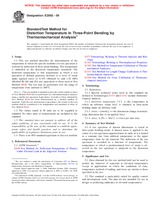Wir benötigen Ihre Einwilligung zur Verwendung der einzelnen Daten, damit Sie unter anderem Informationen zu Ihren Interessen einsehen können. Klicken Sie auf "OK", um Ihre Zustimmung zu erteilen.
ASTM E2092-09
Standard Test Method for Distortion Temperature in Three-Point Bending by Thermomechanical Analysis
Automatische name übersetzung:
Standardtestverfahren für Formbeständigkeitstemperatur im Drei -Punkt-Biege durch thermomechanische Analyse
NORM herausgegeben am 1.9.2009
Informationen über die Norm:
Bezeichnung normen: ASTM E2092-09
Anmerkung: UNGÜLTIG
Ausgabedatum normen: 1.9.2009
SKU: NS-44261
Zahl der Seiten: 5
Gewicht ca.: 15 g (0.03 Pfund)
Land: Amerikanische technische Norm
Kategorie: Technische Normen ASTM
Die Annotation des Normtextes ASTM E2092-09 :
Keywords:
deflection, deflection temperature under load, heat distortion temperature, strain, stress, temperature, thermomechanical analysis (TMA), Deflection, Deflection temperature (under load), Strain testing, Stress, Temperature tests--metals/alloys, Thermomechanical analysis (TMA), Three-point loading, ICS Number Code 83.080.01 (Plastics in general)
Ergänzende Informationen
| Significance and Use | ||||||||||||
|
Data obtained by this test method shall not be used to predict the behavior of materials at elevated temperatures except in applications in which the conditions of time, temperature, method of loading, and stress are similar to those specified in the test. This standard is particularly suited for quality control and development work. The data are not intended for use in design or predicting endurance at elevated temperatures. |
||||||||||||
| 1. Scope | ||||||||||||
|
1.1 This test method describes the determination of the temperature at which the specific modulus of a test specimen is realized by deflection in three-point bending. This temperature is identified as the distortion temperature measured. The distortion temperature is that temperature at which a test specimen of defined geometry deforms to a level of strain under applied stress of 0.455 (Method A) and 1.82 MPa (Method B) (66 and 264 psi) equivalent to those used in Test Method D 648. The test may be performed over the range of temperature from ambient to 300°C. Note 1—This test method is intended to provide results similar to those of Test Method D 648 but are performed on a thermomechanical analyzer using a smaller test specimen. Equivalence of results to those obtained by Test Method D 648 has been demonstrated on a limited number of materials. Until the user demonstrates equivalence, the results of this test method shall be considered to be independent and unrelated to those of Test Method D 648. 1.2 The values stated in SI units are to be regarded as standard. No other units of measurement are included in this standard. 1.3 This standard does not purport to address all of the safety problems, if any, associated with its use. It is the responsibility of the user of this standard to establish appropriate safety and health practices and to determine the applicability of regulatory limitations prior to use. 1.4 There is no ISO standard equivalent to this test method. |
||||||||||||
| 2. Referenced Documents | ||||||||||||
|
Empfehlungen:
Aktualisierung der Gesetze
Wollen Sie sich sicher sein, dass Sie nur die gültigen technischen Vorschriften verwenden?
Wir bieten Ihnen Lösungen, damit Sie immer nur die gültigen (aktuellen) legislativen Vorschriften verwenden könnten.
Brauchen Sie mehr Informationen? Sehen Sie sich diese Seite an.




 Cookies
Cookies
